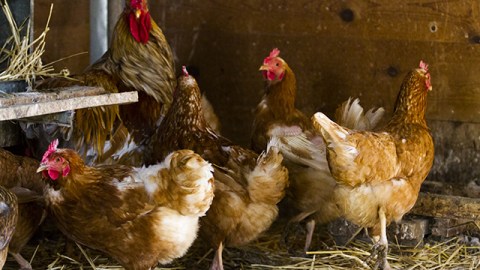The Next Step in Our Moral Evolution

Manipulation is a vicious yet not uncommon human trait. Our ability to alter our surroundings in order to take advantage of a situation was recently on display in The Wolf of Wall Street, when Jordan Belfort flips worthless penny stocks and builds an illegal career from the deal. Of course, this is but one example of something occurring around the planet daily: the reorganizing of facts to gain ground over another.
Human beings are not the only animal skilled at this. Take the chicken. When spotting an aerial predator such as a hawk, a rooster will sometimes send out a danger call, putting himself in harm’s way. It was assumed that he was doing that to protect the female chickens and his offspring, drawing attention away from them in what appeared to be a chivalrous display of bravery.
Well, not quite. A research team at Macquarie University rigged the chickens with special microphones, dubbed Chicken Big Brother 2.0, to watch their barnyard habits. Turns out the male will call out more often when safely protected underneath a bush while another male was exposed. This competitive advantage put his companion in danger, leaving more resources (and ladies) for him.
Social manipulation is not the only trait that chickens share with humans. In fact, they have numerous cognitive skills, including complex decision-making, memory retention, thinking before acting and empathizing with others. A recent Scientific American article revealed many of our previously held assumptions regarding fowls as being naïve.
These latest findings are part of growing literature of research proving that not only are animals as emotionally complex as human beings, but possess a wide range of higher order cognitive processes as well. Popularly, however, humans have viewed animals as being not much more than biologically motivated creatures of habit, using mere instinct where our logic wins out.
As neuroscientist Jak Panksepp has shown, all mammals share at least seven different emotional systems. As he writes,
There is a rapidly growing movement, outside of academic disciplines, to recognize and value the emotions of other animals, but much of that is based on well-reasoned beliefs and fascinating anecdotes rather than on well-collected scientific facts.
He goes on to present data representing a variety of such facts: the sadness, panic, grief, anger and play systems inherent in all mammalian creatures. In one of the more intriguing stories in his book, Panksepp found that petting a rat as you would a cat or dog incites him to bite you. No surprise there. Using special microphones, though, he found that if you flipped a rodent over and tickled his belly, he would begin laughing.
Microphones have helped us understand that a wide swath of the animal kingdom utilizes complex communication systems. Researchers at UCLA estimated that chickens make 24 different sounds to represent an array of emotions. These calls are also ‘functionally referential, meaning that they refer to specific objects broadly, as humans do.
This increasing body of evidence presents humans with important ethical questions. If animals that we assumed to be dumb and unfeeling turn out more complex than we imagined, can we continue justifying their widespread slaughter? As the authors of the Scientific American article, Carolynn L. Smith and Sarah L. Zielinski, write,
The findings also have ethical implications for how society treats farmed chickens: recognizing that chickens have these cognitive traits compels moral considerations of the conditions they endure as a result of production systems designed to make chicken meat and eggs as widely available and cheap as possible.
Of course, considering our at-times total lack of ethics towards other human beings—Occupy Pedophilia in Russia beating and threatening gays, terrible prison conditions in the United States, Amazon’s warehouse conditions—the idea of widespread reform in regards to how we treat animals is not quick in coming.
Yet progress abounds. Rolling Stone’s recent expose on factory farmed animals created quite a stir. Tyson Foods terminated its contract with a farmer shown to be brutally mishandling his pigs. Celebrities have been refusing to play at Sea World after Blackfish aired. And while some were enthused by Joe Namath’s Super Bowl garb, others were not so amused.
Chickens have a life span of ten years, yet are normally terminated at six weeks. They wouldn’t last much longer, given that they’ve been genetically selected for fast growth, resulting in heart disease, osteoporosis and broken bones. And then there’s cases like this single fire on a factory farm in Wisconsin which killed 300,000 chickens in one evening.
Humans have long struggled with ethics. How we treat one another has been at the heart of our religious and spiritual traditions, as well as philosophy, for millennia. As we learn that the brains of other species are not so different than our own, we have to consider them in what has been exclusively human territory. We’ve acted like this planet is ours for eons; the next step in our moral evolution needs to include an antidote to that disease.
Image: urbanlight/shutterstock.com




